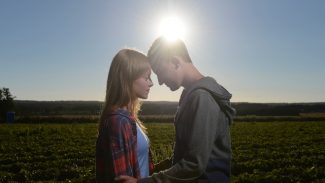Strawberry Days (Wiktor Ericsson, 2016) Sweden
Viewed by Alicia Mae Huhn at The Santa Barbara International Film Festival 2017.
Strawberry Days, a.k.a. Jordgubbslandet, is a coming of age love story highlighting the struggle of racism and classism in a blond hair blue eyed version of the story uncommonly told. Set in Sweden, the story line tenderly reveals the harsh experience of a Polish family arriving in Sweden to work as indentured migrant farm workers. Wojtek, the migrant son is a strapping young man who finds himself in an unsettling new environment on the farm. The life of Anneli, the farm owners daughter, is set in contrast as very routine, prescribed, restrictive, even boring for her. Close up views of the details of the rough daily migrant worker life are portrayed in the conversations of the mother with her mother, Wojtek’s grandmother. She is dissapointed in the man she married for allowing them to live this way. The mother is torn by her love and loyalty to her family and a better life for herself and her son which she could go to if she would leave her husband there. Her mother beckons her on the phone to come home to another life. A life her husband cannot provide. She hangs up and goes back to work with her family. The film adequately portrays the dismal experience of working like slaves in the farm industry of Sweden. Shots of the mothers hands are cracked and stained red. One day the mother faints in the fields and the boss’s do nothing. The workers are outraged, then finally she comes to, leaving the owners off the hook. However, the tension builds as they are all treated as criminals not to be trusted, especially the men. The irony of the setting is that the Swedish family who owns the farm live a humble farm life. Their position as owners, and Swedish, is a place of respect in society but not an opulent existence by any stretch. The two mothers parallel each other in their concern and dedication to their families. Annelie’s mother is a very typical, devoted to working hard in daily housekeeping and running of the farm. Her loving ways and concern for her daughter are demonstrated in her softness of toward social conventions which is in contrast to the father farm owner who is protective, yet judgmental and insists on class separation from the workers. You can see the understanding look on Annelie’s mothers face when she realizes her daughter is attracted to Wojtek. The film definitely shows the women as the strength in the film and in both of their respective families. I agree with this portrayal of women. As women we often are the one who takes a stand and are willing to take the risk to defend others when it would otherwise be unpopular. The struggle of racism and classism are depicted in an enlightening way. The bitterness of the division of race and class is contrasted by the “sweetness” of the story of a forbidden romance. The picking of strawberries perfectly illustrates the cruelty of racism and classism with heat exhausted aching backs and stinging cracking hands red stained from strawberries but looks a little like blood. Also, the sweet taste of the strawberries represent the sweetness and innocence of the young couples love and ultimately love for humanity. I am willing to take a stand for Strawberry Days. I appreciate the varied picture of racism among white people to highlight that people can be cruel by separation based on any number of reasons. Also, looking at how ‘Nations’ or ‘Countries’ have “succeeded” on the failure of others and the need for brave people to stand up, have a voice and actually change the way as humans we treat one another.
About this entry
You’re currently reading “Strawberry Days (Wiktor Ericsson, 2016) Sweden,” an entry on Student Film Reviews
- Published:
- 02.24.17 / 5pm
- Category:
- Films, Santa Barbara Film Festival 2017

2 Comments
Jump to comment form | comments rss [?]